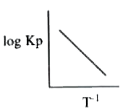On adding NH4HS in following equilibrium NH4HS(s)⇔NH3(g)+H2S(g)
Total pressure in container increases
Partial pressure of NH3 increases, but partial pressure of H2S decreases
Kp increases
No effect is observed
Step by step video & image solution for On adding NH_4HS in following equilibrium NH_4HS(s)hArr NH_3(g) +H_2S(g) by Chemistry experts to help you in doubts & scoring excellent marks in Class 12 exams.
Updated on:21/07/2023Topper's Solved these Questions
Similar Questions
Some inert gas is added at constant volume to the following reaction at equilibrium
NH4HS(s)⇔NH3(g)+H2S(g) predict the effect of adding the inert gas:
View SolutionOn decomposition of NH4HS , the following equilibrium is estabilished: NH4HS(s)⇔NH3(g)+H2S(g) If the total pressure is P atm, then the equilibrium constant Kp is equal to
View Solution
Knowledge Check
Calculate Kp for the equilibrium,
NH4HS(s)⇔NH3(g)+H2S(g)
if the total pressure inside reaction vessel s 1.12 atm at 105.∘C.A0.56B1.25C0.31D0.63
Some solid NH4HS is placed in flask containing 0.5 atm of NH3. What would be the pressure of NH3 and H2S when equilibrium is reached.
NH4HS(s)⇔NH3(g)+H2S(g),Kp=0.11
View SolutionConsider the following reaction at equilibrium: NH4HS(s)<⇒NH3(g)+H2S(g) If some inert gas is added at constant volume, then the
View Solution5.1g of solid NH4HS is introduced in a 16.4 lit. vessel & heated upto 500K KB for equilibrium NH4HS(s)⇔NH3(g)+H2S(g) is 0.16. The maximum pressure developed in the vessel will be :
View SolutionVariation of Kp with temperature T is given by for the following equlibrium 2NH3(g)⇔N2(g)+3H2(g) Thus, decomposition of NH3(g) can be prevented by

View SolutionIn the equilibrium NH4HSs⇔NH3(g)+H2S(g).the forward reaction can be favoured by
View SolutionWrite the equilibrium constant expression for the following equilibria:
N2(g)+3H2⇔2NH3(g)
View SolutionOne mole of N2 (g) is mixed with 2 moles of H2(g) in a 4 litre vessel If 50% of N2(g) is converted to NH3(g) by the following reaction :
N2(g)+3H2(g)⇔2NH3(g)
What will the value of Kc for the following equilibrium ?
NH3(g)⇔12N2(g)+32H2(g)
View Solution
